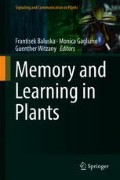Abstract
Across all species, individuals thrive in complex ecological systems, which they rarely have complete knowledge of. To cope with this uncertainty and still make good choices while avoiding costly errors, organisms have developed the ability to exploit key features associated with their environment. That through experience, humans and other animals are quick at learning to associate specific cues with particular places, events and circumstances has long been known; the idea that plants are also capable of learning by association had never been proven until recently. These recent findings that experimentally demonstrated associative learning in plants not only qualify them as proper subjects of cognitive research, but in so doing, they officially open the door for the empirical exploration of cognitive processes like learning, decision-making and awareness in plants. This brief closing chapter considers the wider implications of this research by concluding that the current fundamental premise in cognitive science—that we must understand the precise neural underpinning of a given cognitive feature in order to understand the evolution of cognition and behaviour—needs to be reimagined.
We can never see beyond a choice we don’t understand
The Matrix Reloaded (2003)
An earlier version of this essay was published in the journal Communicative & Integrative Biology (DOI: 10.1080/19420889.2017.1288333).
Access this chapter
Tax calculation will be finalised at checkout
Purchases are for personal use only
References
Adkins-Regan E, MacKillop EA (2003) Japanese quail (Coturnix japonica) inseminations are more likely to fertilize eggs in a context predicting mating opportunities. Proc R Soc Lond B 270:1685–1689
Andrews K (2015) The animal mind: an introduction to the philosophy of animal cognition. Routledge, Abingdon
Appel HM, Cocroft RB (2014) Plants respond to leaf vibrations caused by insect herbivore chewing. Oecologia 175:1257–1266
Bouton ME, Moody EW (2004) Memory processes in classical conditioning. Neurosci Biobehav Rev 28:663–674
Cheke LG, Clayton N (2010) Mental time travel in animals. WIREs Cognit Sci 1:915–930
Crystal JD (2013) Remembering the past and planning for the future in rats. Behav Process 93:39–49
Dukas R, Duan JJ (2000) Potential fitness consequences of associative learning in a parasitoid wasp. Behav Ecol 11:536–543
Edelman GM, Tononi G (2000) The universe of consciousness: how matter becomes imagination. Basic Books, New York
Edelman GM, Gally JA, Baars BJ (2011) Biology of consciousness. Front Psychol 2:4
Ejima A, Smith BP, Lucas C, Levine JD, Griffith LC (2005) Sequential learning of pheromonal cues modulates memory consolidation in trainer-specific associative courtship conditioning. Curr Biol 15:194–206
Ferrari MCO, Wisenden BD, Chivers DP (2010) Chemical ecology of predator–prey interactions in aquatic ecosystems: a review and prospectus. Can J Zool 88:698–724
Ferrari MCO, Vrtelová J, Brown GE, Chivers DP (2012) Understanding the role of uncertainty on learning and retention of predator information. Anim Cogn 15:807–813
Gagliano M (2015) In a green frame of mind: perspectives on the behavioural ecology and cognitive nature of plants. AoB Plants 7:plu075
Gagliano M, Renton M (2013) Love thy neighbour: facilitation through an alternative signalling modality in plants. BMC Ecol 13:19
Gagliano M, Vyazovskiy VV, Borbely AA, Grimonprez M, Depczynski M (2016) Learning by association in plants. Sci Rep 6:38427
Gibson JJ (1977) The theory of affordances. In: Shaw R, Bransford J (eds) Perceiving, acting, and knowing: toward an ecological psychology. Erlbaum, Hillsdale, NJ, pp 67–82
Ginsburg S, Jablonka E (2007a) The transition to experiencing: I. Limited learning and limited experiencing. Biol Theory 2:218–230
Ginsburg S, Jablonka E (2007b) The transition to experiencing: II. The evolution of associative learning based on feelings. Biol Theory 2:231–243
Hastie R, Dawes RM (2010) Rational choice in an uncertain world: the psychology of judgment and decision-making. Sage, London
Heyes C (2012) Simple minds: a qualified defence of associative learning. Phil Trans R Soc B 367:2695–2703
Hollis KL, Dumas MJ, Singh P, Fackelman P (1995) Pavlovian conditioning of aggressive behavior in blue gourami fish (Trichogaster trichopterus): winners become winners and losers stay losers. J Comp Psychol 109:123–133
Koch C (2004) The quest for consciousness: a neurobiological approach. Roberts, Englewood, CO
Marder M (2013) Plant-thinking: a philosophy of vegetal life. Columbia University Press, New York
Marder M, Gagliano M (2016) Revolution. In: Marder M (ed) Grafts – writings on plants. University Press, Minnesota, pp 79–82
Menzel R, Greggers U, Smith A, Berger S, Brandt R, Brunke S, Bundrock G, Hülse S, Plümpe T, Schaupp F, Schüttler E, Stach S, Stindt J, Stollhoff N, Watzl S (2005) Honey bees navigate according to a map-like spatial memory. Proc Natl Acad Sci USA 102:3040–3045
Packard A, Delafield-Butt JT (2014) Feelings as agents of selection: putting Charles Darwin back into (extended neo-) Darwinism. Biol J Linn Soc 112:332–353
Pelizzon A, Gagliano M (2015) The sentience of plants: animal rights and rights of nature intersecting? AAPLJ 1:15–14
Pickens CL, Holland PC (2004) Conditioning and cognition. Neurosci Biobehav Rev 28:651–661
Seth AK, Izhikevich E, Reeke GN, Edelman GM (2006) Theories and measures of consciousness: an extended framework. Proc Natl Acad Sci USA 103:10799–10804
Shettleworth SJ (2001) Animal cognition and animal behaviour. Anim Behav 61:277–286
Shettleworth SJ (2010) Cognition, evolution and behavior. Oxford University Press, Oxford
Tononi G, Koch C (2015) Consciousness: here, there and everywhere? Phil Trans R Soc B 370:20140167
Zentall TR, Stagner J (2011) Maladaptive choice behaviour by pigeons: an animal analogue and possible mechanism for gambling (sub-optimal human decision-making behaviour). Proc R Soc Lond B 278:1203–1208
Author information
Authors and Affiliations
Corresponding author
Editor information
Editors and Affiliations
Rights and permissions
Copyright information
© 2018 Springer International Publishing AG, part of Springer Nature
About this chapter
Cite this chapter
Gagliano, M. (2018). Inside the Vegetal Mind: On the Cognitive Abilities of Plants. In: Baluska, F., Gagliano, M., Witzany, G. (eds) Memory and Learning in Plants. Signaling and Communication in Plants. Springer, Cham. https://doi.org/10.1007/978-3-319-75596-0_11
Download citation
DOI: https://doi.org/10.1007/978-3-319-75596-0_11
Published:
Publisher Name: Springer, Cham
Print ISBN: 978-3-319-75595-3
Online ISBN: 978-3-319-75596-0
eBook Packages: Biomedical and Life SciencesBiomedical and Life Sciences (R0)

